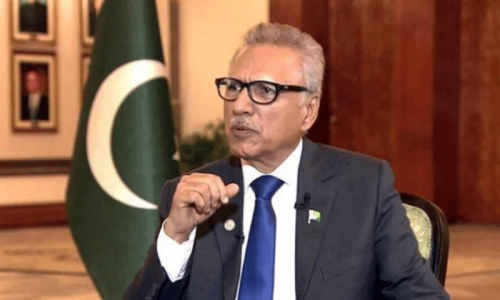ISLAMABAD: Voicing concerns over the prevailing political uncertainty in the country, representatives of the country’s mainstream political parties, civil society, media and academia on Wednesday cast doubt over the fairness of the upcoming general elections.
Speaking at a “consultative session” on “How to ensure free and fair general elections?” organised by Pakistan Institute of Legislative Development and Transparency (Pildat), the speakers were found unanimous in their views that some powerful circles in the country wanted to delay the elections for an indefinite period on one pretext or the other.
The speakers also expressed concerns over the increasing role of the “military establishment in the political and electoral sphere” and feared that the events of May 9 could be used to shrink the space for democratic and political forces and might be used for “manipulations” in the elections.
Speaking on the occasion, Pakistan People’s Party (PPP) Secretary General Farhatullah Babar said there were serious doubts whether elections would be held at all. He said recent statements by important political leaders and refusal by the Election Commission of Pakistan (ECP) to give election schedule was raising doubts in the minds of the people.
Say some power circles want to delay polls for an indefinite period
Mr Babar was of the view that the political parties and the civil society should compel the ECP to announce a categorical date for the elections even if it wanted to delay it till January next year.
Expressing his concern over the increasing role of the ‘establishment’ in the political matters, Mr Babar said: “The military establishment must be asked to cease political engineering.” He also asked the ECP to take notice of such ‘engineering’.
He also called for an independent investigation into the recent “disappearances of political activists for weeks and then reappearing only to denounce their previous political leaders.”
“Is a caretaker set-up necessary at all? Does it exist in other democracies?” he asked.
He regretted that neither the parliament nor the ECP had come out with any inquiry report into the failure of the RTS [Result Transmission System] in the last elections. He also called for exploring the implementation of compulsory voting and introducing a “None of the Above (NOTA)” option in the ballot paper to enhance the democratic process.
Former Punjab governor Shahid Hamid was of the opinion that the president had the authority to announce the date for the elections of the National Assembly, but regretted that he had not done so.
“I am not hopeful that we will have free and fair elections in the country whenever it will be held,” he said.
Ishaq Khakwani, representing the newly-established Istehkam-i-Pakistan Party (IPP), shared his extensive experience in elections, and declared that “polls and government formation in Pakistan not possible without engineering.” He said no political party had ever refused support from the establishment.
Rasheed Chaudhry, a representative of the Free and Fair Election Network (Fafen), emphasised the need for an independent delimitation commission and separation of the ECP’s powers from judicial authority.
Shoaib Shaheen of the Pakistan Tehreek-i-Insaf (PTI) highlighted the cases of former party leaders Usman Dar and Sadaqat Abbasi and lamented the growing “erosion of respect for state institutions.”
Mr Shaheen pointed out that trust and faith in the system were diminishing, exacerbated by heightened political polarisation, which he noted had led to increased violence. He called for a thorough investigation into the events of May 9 through a judicial commission.
Dr Tariq Fazal Chaudhry of PML-N denied the impression that his party wanted to delay the elections.
Executive Director of Gallup Pakistan Bilal Gilani stated that probably the country had never faced such an uncertain political situation before the polls.
Mr Gilani noted that while the election was a significant issue, 89 per cent of the people considered “inflation” as more important issue than the elections and 50 per cent of the people believed that ‘democracy is falling short of delivering’. He said 75 per cent of the population believed that they would not have a better time in future.
Muhammad Ali Durrani, a former federal minister in the military regime of Gen Pervez Musharraf, stated that in Pakistan democracy belonged to the “electables” and not the people. He called for simultaneous elections at the federal, provincial and local government levels.
Senior journalist Mujibur Rehman Shami underscored a core issue plaguing Pakistan’s political landscape — the reluctance of political parties to accept defeat gracefully. He also highlighted the issue of institutional interference as a significant obstacle to a smooth electoral process.
In his introductory remarks, Pildat president Ahmed Bilal Mehboob narrated a history of manipulation of Pakistan’s earlier general elections. He said Pildat remained committed to fostering discussions and facilitating informed dialogue on the crucial issue of free and fair elections in Pakistan.
The event concluded with a commitment to continue advocating for electoral transparency and the protection of democratic values in the country.
Published in Dawn, October 12th, 2023













































Dear visitor, the comments section is undergoing an overhaul and will return soon.